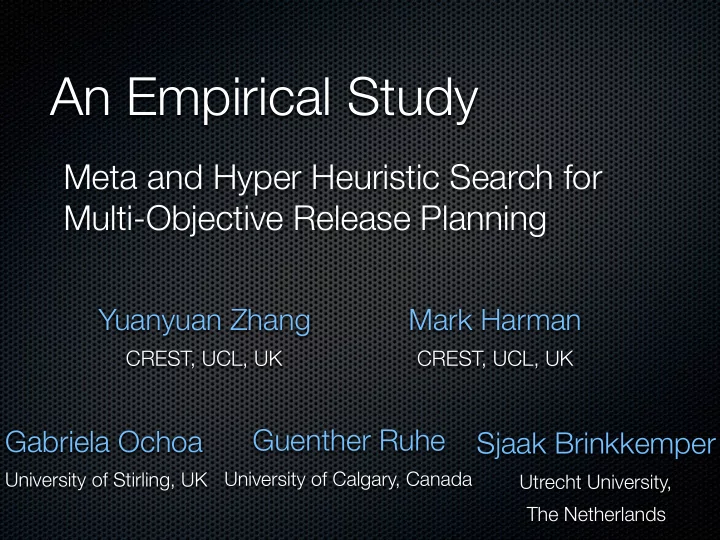

An Empirical Study Meta and Hyper Heuristic Search for Multi-Objective Release Planning Yuanyuan Zhang Mark Harman CREST, UCL, UK CREST, UCL, UK Guenther Ruhe Gabriela Ochoa Sjaak Brinkkemper University of Calgary, Canada University of Stirling, UK Utrecht University, The Netherlands
Agenda Contributions Background Data sets Fitness functions Algorithms RQs Results & analysis
A Thorough Empirical Study Fitness Functions Data Sets Algorithms
A Thorough Empirical Study Fitness Functions Data Sets Algorithms
A Thorough Empirical Study Fitness Functions 10 Real World Data Sets Data Sets Algorithms
A Thorough Empirical Study Scenario Based Fitness Functions Objectives 10 Real World Data Sets Algorithms Data Sets
Fitness Functions A Thorough Empirical Study Scenario Based Objectives A Wider Spectrum of 10 Real World Algorithmic Behaviours Data Sets Algorithms Data Sets
Release Planning Repository requirements and change requests
Release Planning Repository requirements and change requests
Release Planning Repository Release 1 Release 2 Product or Service Release 3
Strategic Release Operational Release Planning (SRP) Planning (ORP) SRP is concerned with ORP deals with how to how to select and assign developers to assign requirements to the tasks to be multiple subsequent performed. releases.
Models Stakeholders Number (M) Stakeholders Weight (W) Stakeholders
Models Cost (C) Value (V) Time to market (T) Risk (R) Requirements Frequency of use (F)
Models Dependence (D) And Or Precedence Value-related Requirements Cost-related
Models Release Release 1 Number (K) Release 2 Release Release 3 Importance (I) Releases
Data Representation A set of requirements . . . . . . . . . . . . . . . . . . . RQ1 RQ2 RQn 1 3 2 2 1 0 3 1 0 3 Release 2 Release1 Not included
Fitness Functions A Thorough Empirical Study Scenario Based Objectives A Wider Spectrum of 10 Real World Algorithmic Behaviours Data Sets Data Sets Algorithms
10 Real World Data Sets
Scenario-based Fitness Functions FREQUENCY, IMPORTANCE, … N Maximize f ( x ) = VALUE I k i,k i =1 N Minimize f ( x ) = COST i,k i =1 IMPACT, RISK, …
A Wider Spectrum of Algorithmic Behaviours Local In-Between Global Hill Climbing NSGA-II Simulated Annealing
A Wider Spectrum of Algorithmic Behaviours Local Meta In-Between Global Hill Climbing NSGA-II Simulated Annealing Hyper HHC HSA HNSGA-II
A Wider Spectrum of Algorithmic Behaviours Meta-heuristics Hyper-heuristics HHC Hill Climbing HSA Simulated Annealing NSGA-II HNSGA-II Random
10 Hyper-Heuristic Operators Ruin & Recreate 1 Random 2 Swap 3 Delete_Add Delete_Add_Best 4 Delete_Add_Best 5 Delete_Worst_Add 6 Delete_Worst_Add_Best 7 Delay_Ahead 8 Delay_Ahead_Best 9 Delay_Worst_Ahead 10 Delay_Worst_Ahead_Best
Operator: Delete_Add_Best delete a requirement from the release with uniform probability 1 3 2 2 2 1 0 3 1 0 3 1 3 0 2 1 0 3 1 0 3
Operator: Delete_Add_Best add the best requirement (based on one of fitness values) to one release 1 3 0 2 1 0 3 1 0 3 find the best requirement 1 3 0 2 1 0 3 1 2 3
Adaptive Operator Selection Credit assignment Extreme value credit assignment Fitness improvement: hypervolume difference Reference value: the fitness of the parents Operator selection Probability matching
Performance Metrics Quality Convergence Hypervolume Contribution Unique Contribution Diversity is only interesting if the algorithm’s quality is strong Speed All the metrics were normalised between 0.0 and 1.0 and converted to ‘Maximising metrics’.
Research Questions RQ 1 - Quality : Which algorithm performs best? RQ 2 - Diversity : What is the diversity of the solutions produced by each algorithm? RQ 3 - Speed : How fast can the algorithm produce the solutions? RQ 4 - Scalability : What is the scalability of each algorithm with regard to solution quality, diversity and speed?
Results & Analysis RQ 1 - Quality
RQ 1 - Quality For the meta-heuristic algorithms, NSGA-II performs best overall for quality on smaller datasets SA performs noticeably better on the three larger datasets The three hyper-heuristic algorithms outperform their meta-heuristic counterparts; HNSGA-II is beaten by its meta-heuristic counterpart only on the Ericsson dataset.
Results & Analysis RQ 2 - Diversity
RQ 2 - Diversity Random search perform very well, but the solutions are largely suboptimal Of the Hyper-heuristic algorithms, HNSGA-II exhibits the best diversity NSGA-II significantly outperforms HNSGA-II for Ericsson dataset HNSGA-II significantly outperforms NSGA-II on Mozilla and Gnome
Results & Analysis RQ 3 - Speed
RQ 3 - Speed The speed of random search is worse than all other algorithms for the larger datasets HNSGA-II is fastest overall
Results & Analysis RQ 4 - Scalability
RQ 4 - Scalability The quality of solutions NSGA-II produced decrease as the problem size increase NSGA-II’s contribution to the reference front decrease, as the number of requirements increase A negative correlation between the number of requirements and convergence of NSGA-II For the other algorithms, there is no negative correlation between problem size and solution quality The algorithms increase their diversity as the scale of the problem increase
Recommend
More recommend